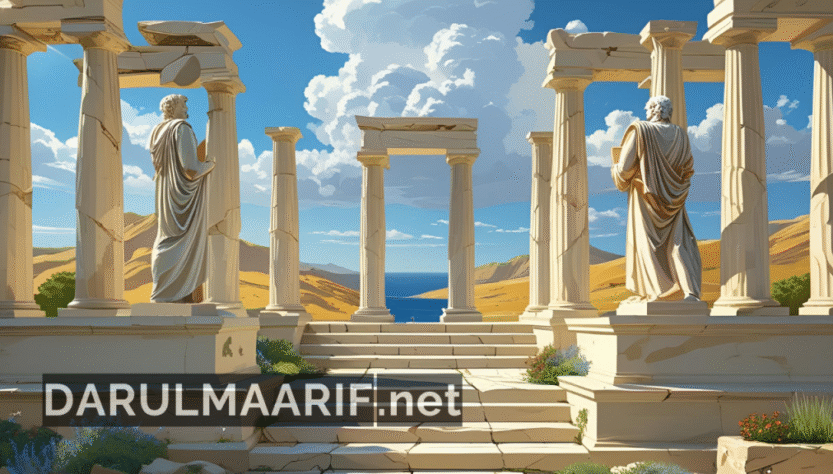Darulmaarif.net – Indramayu, August 17, 2025 | 08.00 WIB
In today’s Indonesian classroom, educators face complex reality: students who grow in digital flows, parents who demand instant outcomes, as well as curriculum that sometimes emphasizes the target of achievement rather than the formation of character. In the midst of that challenge, the term Fix the mindset And growth mindset Often used as a motivational jargon. The teacher is expected to be able to foster attitudes growth mindset In students – there is a belief that the ability to develop through business and learning.
However, is it true that education stops here? Is the highest purpose of learning only to develop and continue to grow? The philosophers, both from ancient Greece to classical Islam, gave us a wider map. They show that behind growth mindset There are still deeper levels of mind, which can give direction to Indonesian education: from just pursuing growth towards the search for meaning, wisdom, and wisdom.
Transcendence Mindset: beyond the ego
Jean-Paul Sartre once said: “Humans are none other than what he made from himself.” (Humans are none other than what he created from himself). Transcendence education teaches students not only to add skills, but to shape authentic themselves. In Islam, this is similar to tazkiyatun nafs—The washing soul from a narrow ego to a more noble vision of life.
Mindset Stoik: focus on self -control
Epictetus, a Stoa philosopher, said: “That’s not what happened to you, but how you react to the important thing.” (What’s important is not what happened to you, but how you respond). The teacher who teaches stoisism instills determination: students may fail in the test, but they can learn to accept, rise, and try to return. This is the core of character education.
Dialectical mindset: learning from ideological conflict
Hegel called history as “Opening the Spirit through contradictions.” (The development of the Spirit through contradictions). Students also need to be trained not to be afraid of differences of opinion or failure. Precisely from the dialectics – thesis, antithesis, synthesis – a new knowledge. Wise teachers not only provide answers, but also provide student space to process contradictions into novelty.
Integrative Mindset: Unite Fixed and Growth Mindset
Muslim philosopher, al-Farabi, in Tahsil al-sa’aan emphasize the balance between theoretical reason and practical reason. There are things that are fixed (still), like human nature and natural law, but some can develop (growth), namely intellectual and moral potential. Integrative mindset teaches teachers and students to accept both, not thinking of one of them as a barrier.
Wisdom Mindset: The Highest Purpose of Education
Ibn Sina wrote in Al-Shifa ‘: “The purpose of knowledge is not only to be known, but to act according to what is known.” (The purpose of science is not only knowing, but do according to what is known). This is the core wisdom: Science that bear fruit. True education is not only printing smart students, but forms a wise person, in line with the truth, goodness, and beauty.
Light education
Al -Qur’an also emphasizes the priority of wisdom:
Wisdom comes to anyone
Meaning: “The Almighty gives the wisdom that he will. And whoever is awarded wisdom, then he has been awarded a lot of goodness.” (Surah Al-Baqoroh Verse 269)
This verse emphasizes that wisdom is not only intellectual intelligence, but also a divine gift that combines knowledge, morals, and wisdom in acting. Classical mufassir, such as Ibn Kathir, interprets wisdom as: a deep understanding of the Qur’an, a healthy mind), and accuracy in speech and action. In other words, wisdom is the ability to connect knowledge with true actions.
For educators, this verse reminds that the ultimate goal of the learning process is not just academic achievement, but gives birth to students who are healthy (ulul albab) – they are able to weigh, reflect, then take lessons from every reality of life they face.
In the hadith, Rosululloh SAW also said:
Anyone who wants God to be better for him to agree with Him in religion
Meaning: “Anyone who wants to be good from him, God will understand it in religious matters.” (Hours. Bukhori and Muslim Imam)
This hadith shows that the measure of the goodness of a human being is not just in the extent of worldly knowledge, but at the depth of his religious understanding. Fiqh fid-din does not only mean the mastery of fiqh law technically, but rather a deep understanding that shapes the attitude of life, mindset, and wisdom in dealing with problems.
Imam al-Nawawi in Syarh Sahih Muslim explained that tafaququh (religion) included knowledge of faith, sharia, and morals. Thus, a student with the mindset of growth can continue to grow in the world, but students who wisely given by God will make that development a way to the goodness of life, the hereafter, and one -the only SWT SWT Ridlo.
If the teaching staff in Indonesia only stop at growth mindsetSo students may grow smart, but not necessarily wise. By bringing education to the level of philosophy – Mindset transcendence, stoic, dialectical, integrative, and eventually wisdom – education will return to the purpose of the sacred: revive humans and humanize fully humans.
Hope it is useful. Wallohu a’lam.
Game Center
Game News
Review Film
Rumus Matematika
Anime Batch
Berita Terkini
Berita Terkini
Berita Terkini
Berita Terkini
review anime
